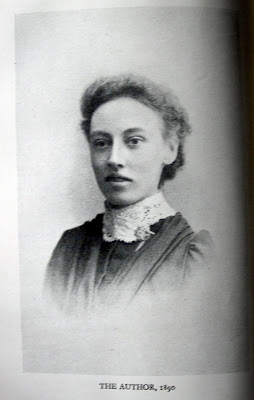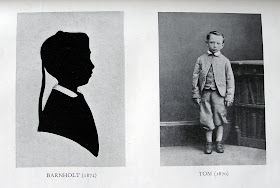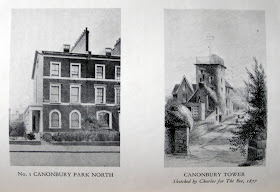 My book review of 'A London child of the 1870's' by M. Vivien Hughes. Is a delightful autobiographical addition to Persephone books. It is maybe not as flowing in a literary style, but does capture the essence of a child growing up in a middle class family of that time period.
My book review of 'A London child of the 1870's' by M. Vivien Hughes. Is a delightful autobiographical addition to Persephone books. It is maybe not as flowing in a literary style, but does capture the essence of a child growing up in a middle class family of that time period.Mary Vivien Thomas, born in October 1866 the youngest, with four older brothers, Tom, Dym, Charles, Barnholt and parents who in many ways are very liberal in their attitude to bringing up children. In 1870 they move to Canonbury, North London and live there for nine years. Their father works in the City, something to do with stocks. They have their ups an downs financially, but are never poor and have a couple of servants.
It's a charming review of a child's life. how did children play back then? What did they play with? Learning at home, the books she read, relatives who often visited. Her joy of life, wit and insight fullness.
The highlight of life was visiting her mother's family in Reskadinnick, Cornwall. These accounts are full of Cornish life back then, and I love the quotes from the locals. My grandfather came from Somerset and I can relate to that pattern of old speech. She mentions a manchet loaf of bread, that was not put in a tin to form, and if it was cut, must not be left on the table, a superstition. She also mentions her mother's family money coming from the tin mining business, which goes all the way back to the time of the Phoenicians who traded tin from Cornwall. Mollie mentions a trip that her aunt Tony took to Norway with her grandfather to buy Norwegian logs for pit props. Just interesting history.
There is a lot of mention of reading of those very pious religious Victorian books to teach morals, that mostly taught fear.
With all the liberalness of the family Mollie was not taken out on trips as much as the boys were, such as the Lord Mayor's Show, a steam boat trip to Greenwich. In fact she says, "Of course I was never allowed to go there myself." And further on that page she says "Strange as it seems I was never taken to anything more exciting than a picture gallery, not even to a Pantomime at Christmas..." Mollie does not resent this, but states it as a fact. "My father's slogan was that boys should go everywhere and know everything, and that a girl should stay at home and know nothing."
One entrance that caught my eye was a visit to Bumpus Book Shop in Oxford Street, London. It seems it was a very large and well known bookshop so here is a link to Bumpus Book Shop, don't you love that name? I think we would have liked to visit Bumpus Book Shop.
All the photos below are from the first book, except for the first photo of the author.







 I wrote this a couple of days ago before the above review.
I wrote this a couple of days ago before the above review.I had totally not thought about this book, 'A London Child of the Seventies', as I do not have this book as a Persephone publication. I was driving home from work today and it suddenly flashed into my mind, that I had this book, in fact the trilogy. I was so excited thinking I could do a review on it when I almost missed my exit to go shopping.
I first ran across the autobiographical works of M.V. Hughes over twenty-five years ago, in the form of a paperback discard from our local library which I happened to buy. It was 'A London Girl of the Eighties'. I so loved this book that I read it over several times during that time period.
In more recent years I realized that it was part of a trilogy, 'A London Child of the Seventies' and 'A London Home in the Nineties.' So I thought let me try and find it on ebay and in my first week of looking I came across A London Family 1870 - 1900, by M. Vivien Hughes. What is so nice about this is I have the 1947 trilogy, first published 1946. Full of photos. The three books having been first published in 1934,1936,1937. I don't know if the Persephone publication has photos in, so thought that I would post some here.
I always felt that these books would make wonderful reference works if you were writing a fictional novel in that time period. You would be able to capture the period by reading these books. But of course the writings are far more than a reference book you feel you have walked those streets with Molly.
I do have one question of Persephone. Why did they choose A London Child of the Seventies? Persephone calls it A London Child of the 1870's. As opposed to, what I personally think is the most interesting of the trilogy, A London Girl of the Eighties. That opinion could be totally subjective.
In any case try and read both, the last book of the trilogy is not I feel quite as interesting.
Christy
Just reading the books...half way through the second and it is more vivid than the first....
ReplyDeleteI want to know more but there is not much online...
Thank you a million times for taking the photos of the photos...it's lovely to see the people I am getting so involved with...I purchased a Oxford classics trilogy on eBay but it has no photos...
Strange is it not that a child who was hardly allowed to do anything because she was female ended up a few years later being a pioneer in education...
Thank you again
I have always loved these autobiographies, such a snapshot in time.
DeleteMaybe it contributed to her going into education.
Delete